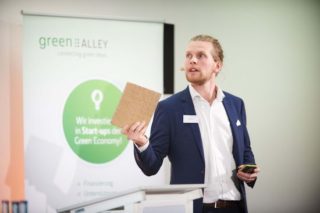Back in June 2015, Tom Robinson won the monthly Shell LiveWIRE Smarter Future award, which came with £5,000 in funding and expert advice to grow his business. In March 2016, he went one better. Out of a strong field of six sustainability-driven young innovators, he had the honour of being named the Shell LiveWIRE 2015 Entrepreneur of the Year. This earned him an additional £25,000 in funding, and provides the perfect platform for his business to kick on and address real problems that the public faces.
Our CEO Jurga Zilinskiene is a former award winner in the same competition, and worked closely with Shell LiveWIRE as a judge for this year’s roster. In support of this year’s victor, we spoke to Tom about Adaptavate’s mission and what the future might hold for him.
1.What is Breathaboard, and what issues does it address?
Breathaboard is a high-performing, bio-composite alternative to the conventional building material Plasterboard. It is used and installed in exactly the same way, but we gave it some great benefits. Its called Breathaboard as it ‘breathes’ with the people in the building and therefore passively regulates the internal environment – reducing risk of condensation and mould growth – helping to create healthy people in healthy buildings.
2. What inspired you to develop Breathaboard?
Whilst working as a builder, I saw the problem of loads of hazardous plasterboard waste going to landfill, and the problem in so many houses of condensation leading to mouldy walls and ceilings. Combine the two, and that is where the idea came from.
3. What traits do you think a successful entrepreneur needs to possess?
I guess I am still figuring that out for myself! It’s a work in progress, I think, but there are 3 main things that stand out from my experiences so far.
1) The ability to see a vision and believe in it and communicate it with a clarity.
2) Conscious persistence – you have to know when to get your head down and work towards a goal or milestone, but also know where to focus your efforts towards – i think there is a big difference between conscious persistence – striving for the right goals and mindless persistence – where you just work over hard for all the goals – when you run the risk of never achieving anything.
3) The ability to listen and hear – and then being able to judge whether that is something you should really take notice of! A lot of what makes a really good leader and entrepreneur is the ability to listen to stakeholders/customers/advisors and have the ability to adapt.

4. In your opinion, do young British innovators focus enough on sustainability?
There is never going to be a world that is ‘too sustainable’, so probably not. I see ‘sustainability’ (although the word has become a little meaningless now) as a massive opportunity for young British innovators. But they need the support to get their ideas and new business models of the ground – and that is something that is lacking in the UK at the moment. Its great having a sparky idea – but how do we scale it to make it economically valuable whilst realising the social and environmental impact it could potentialy have? That the crux of the issue and that is where the government needs to consider how they provide their support.
5. What goals do you have for your firm following Shell LiveWIRE?
The support from SLW is brilliant, but we are really clear about our commercialisation strategy going forward so we are continuing with that. Winning the competition helps catalyse that and help to add to the team to bring it to reality…quicker!
6. Where do you see yourself and your brand in five years’ time?
I set out to change the way that materials are made – thats why i set up Adaptavate and developed Breathaboard and so far its been great fun and rewarding (however, not without its challenges!) I see Breathaboard doing well and taking increasing market share of the conventional material. I think Adaptavate has got a few more ideas up its sleeve that we will look to get out in the next 5 years and me personally – well, I would like to be helping younger people in school really think about the ecological issues we are facing and how they can approach them with positivity and help them realise the vast opportunities for positive change and value creation. I believe that ‘sustainability’ is not a ‘subject at school’ but a way of education right across the curriculum and I am really keen to develop that thinking in schools….as well as develop a few more products.
7. The product clearly has potential beyond Britain. Do you hope to launch it in foreign countries? If so, which countries are most attractive to you?
We already have a strong interest from Germany and Holland and they are really attractive markets. But the beauty in the way we imagine scaling our products is through a localised model as opposed to a centralised model. this means that bio materials can be grown in local areas, produced there and sold there and still reach the scale we need whilst achieving a mega triple bottom line.
8. What challenges do you think would come with launching in foreign markets?
Quality control will be the main one I would assume, along with communication and market intelligence. However there are challenges to getting a product to the market on your own back doorstep so we won’t let that worry us too much.
Check out the rest of the Today Translations News and Resources Section
Keep abreast of Tom’s journey and Adaptavate’s development with the twitter handle @adaptavate and their website http://www.adaptavate.com/

